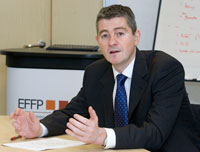Food businesses need strategy, not tactics, conference hears

Food and farming businesses will need to develop radical new business models to cope with higher inflation and volatility in commodities markets, a leading industry analyst has said.
A new era of permanently higher prices for raw foodstuffs meant food companies needed to switch from a from a tactical approach in the way they buy and sell food to a more strategic business model, said Sion Roberts, chief executive of food chain consultant European Food and Farming Partnerships.
“The trend in falling prices for the raw materials that underpin food production over the past 20 years is set to reverse in the long term. We’re not expecting prices to go up in the short term, but over the next 20-30 years they are likely to increase”, Mr Roberts told a recent conference organised by animal pharmaceutical giant Alltech.
The food industry was about to experience the degree of change that the oil sector had seen since the 1960s, where demand soared and prices climbed from $3/barrel to $125/barrel today, he said.
The current spike in agricultural prices, along with higher inflation, meant higher prices were here to stay. And global food security was now firmly back in the headlines, he added.
“We’re coming from an age of prosperity in the last couple of decades where food was affordable to a sombre decade when food affordability could balance out.”
“Food companies need a strategic supply trinity of security, stability and sustainability,” Mr Roberts said.
“This is a model which is about developing the relationships between people and businesses within the food chain, so that they work together,” said Mr Roberts.
Collaboration was key to unlocking these benefits, he said, making the opportunity to spread risk through forming co-operatives more attractive.
“There are opportunities for people to get higher prices for their products in the short term, but strategic long-term relationships with your customers will hold you in good stead”.
Many food and farming businesses had become focused on the short term tactical thinking at the expense of long-term planning, he said.
“There is a temptation to make hay while the sun shines, but there is also an opportunity to position yourself strategically with your customers which will pay dividends in the next 10-20 years”
Forecast
In its latest forecast, EFFP expected food price inflation to peak at around 7%, almost half of the level seen in 2008, when food commodity prices rose sharply.
However, EFFP said much depended on the size of the 2011 harvest, with weather and growing conditions being the key risk factors.
Despite this forecast for the short term EFFP reckoned current volatility was a precursor for permanently higher prices for agricultural products in the long term.
• To view a free copy of the full report visit www.effp.com
